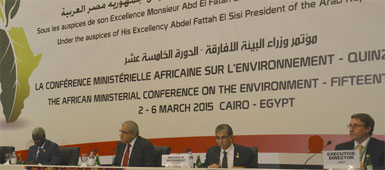Last week, Environment Ministers across Africa released the Cairo Declaration, with all 54 countries demanding that global warming be limited to 1.5C by 2100.
That means advanced nations must submit much more aggressive climate targets for the Paris Climate Summit in December. Currently, the world’s goal is to stay below 2C, and most doubt climate targets will even reach that.
They also want parity between climate mitigation and adaptation in the international agreement, and they want it to be binding, not voluntary.
The half-degree difference could mean life or death for low-lying islands, coral reefs, crop yields and sea level rise in North Africa and the Middle East, according to the 2014 World Bank report, Turn Down the Heat: Confronting the New Climate Normal.

Notably, the Declaration also commits Africa to integrate an "inclusive green economy" into planning and resolves to improve protection of the continent’s abundant natural resources and wildlife.
"The only insurance against climate change impacts is ambitious global mitigation action in the long-run, combined with large-scale, rapidly increasing and predictable funding for adaptation. Investment in building resilience must continue to be a top funding priority, including as an integral part of national development planning," says Achim Steiner, UN Under-Secretary-General and Executive Director of the United Nations Environment Program (UNEP).
"It is a grave responsibility that also carries myriad opportunities for the future welfare, prosperity, and development of the continent and its people," he says.
Transitioning to a Green Economy
African Ministers agreed to optimize the use of natural resources for sustainable development and to alleviate poverty, creating jobs through small and medium-sized businesses.
Green investments, such as renewable energy, will drive economic growth faster than business-as-usual investments, and allow Africa to preserve its natural resource foundation wealth on which economies, lives, and livelihoods depend, says the Green Economy Africa Synthesis study.
Combating Illegal Trade in Wildlife
African Ministers will develop a common strategy to stop illegal logging and fishing, poaching and wildlife trafficking at April’s International Conference on Illegal Trade.
Wildlife and forest crime has become one of the largest transnational organized criminal activities alongside drug trafficking, arms, and trafficking of human beings.
Beyond environmental impacts, it deprives developing economies of $70 billion to $213 billion in lost revenue each year, according to numerous organizations – Organization for Economic Cooperation and Development (OECD), UN Office on Drugs and Crime; CITES, UNEP and INTERPOL.
